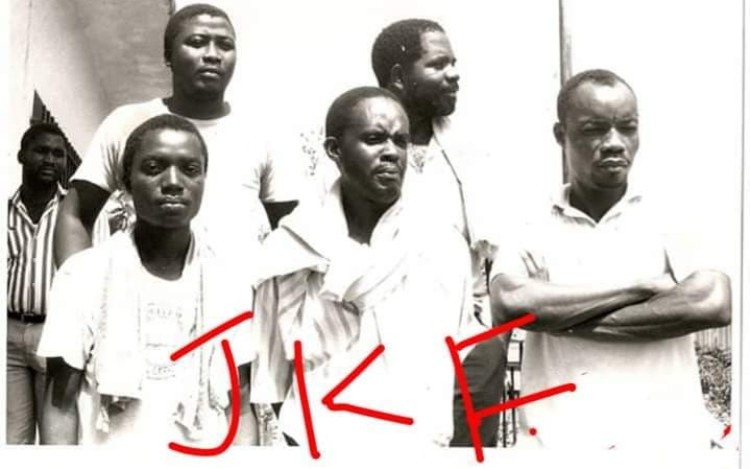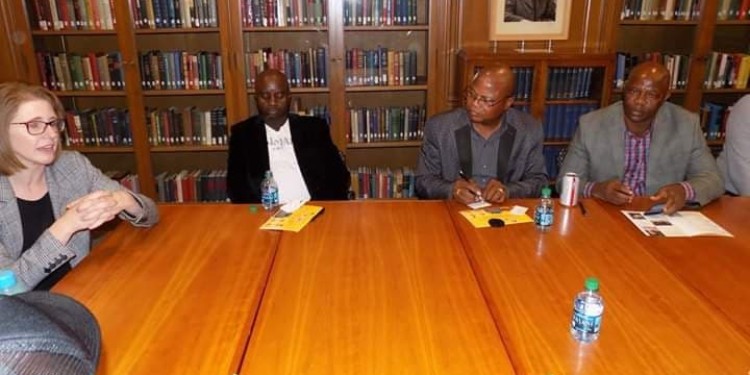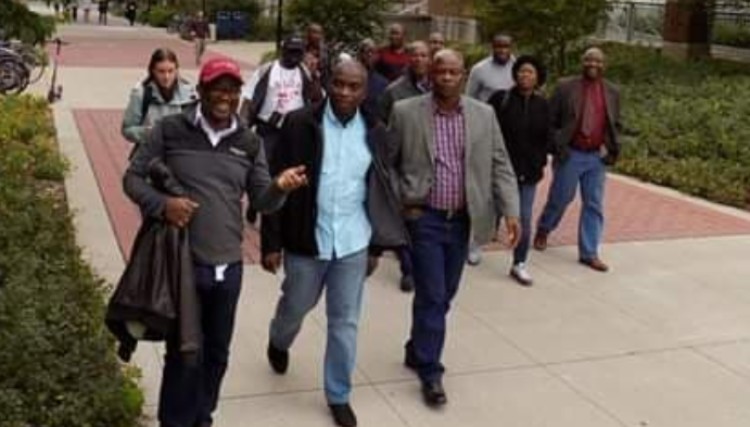Liberia: Conflict of interest and independent journalism
By James Kokulo Fasuekoi in Minneapolis, MN

Let me express thanks to Cyrus McGee, for his input to my discussion at bay, which especially, centers on the roles of the Liberian journalists union, known as PUL, as well as members of the independent media, in the wake of persistent physical attacks on independent journalists in Liberia. I also wish to thank Mrs. Varnetta Johnson Freeman for her contribution to the subject for I appreciate diverse views from everyone irrespective of one’s political, cultural or religious beliefs.
Nevertheless, allow me to respectfully disagree with Mrs. Freeman especially on her notion that it is binding upon journalists (including Liberian) to serve the public with news for it’s the “public’s rights to know” and as such they, public, can’t and shouldn’t be “denied” such right.
First of all, Mrs. Freeman says that one’s right to gaining access to information is fundamental, which, according to her shouldn’t, be denied-she makes a reference to the “FOI policy” and I agree, to some extent. At the same time, to my surprise though, she states nothing absolutely regarding the rights of professional media men (and women?) whose rights, and in some cases, lives have been, continue to be compromised, amid continuous beatings and other humiliations by loose security men, following Monrovia authorities around. This is despite she’s a part of the media too.
Indeed, she’s making such observation at a time when the FPA is showing the world, yet a photograph of another wounded Liberian reporter- the victim reportedly got wounded at the hands of the same group of security. In other words, by our sister’s logic, even in the face of such brutalities, journalists in Liberia must still go ahead anyhow, bury their heads in the sands and pretend “all is well” (for they don’t have feelings or families) and they are supposed to obey, and report the news anyhow. That the gathering and dissemination of information must go on uninterrupted, even at the expense of the lives of journalists as the public has the right to know.
This line of logic, in my mind, begs the question as to whether we, journalists have fully read, and understood what the “FOI’s” bargaining entails. That’s because, I personally know that every agreement, or, an agreement of such nature for that matter, must have two sides to it; that it must also come with certain conditions, meaning, imposing responsibilities to all parties which I strongly believe is the case here: not only with the “FOI” but any other legal or none legal entity.
In addition, do we not know that we, journalists also have equal rights just as the “public” which has a right to know? Or are we not supposed to be counted as human beings for that matter? Do we not know that we, journalists have the right to stay alive before we can even think of serving the “public” or “government?” Also, are we not aware that the first law of nature is self-preservation? That a journalist must make sure to stay alive; it is only then that he or she would be able to practice or serve?
By the way who says Liberian journalists do not have rights to live, think or report freely?

Of course, we journalists do, and that is why we banded together and challenged countless attacks mounted against independent media entities under Samuel Doe’s rule. The press also challenged the regime’s draconian rules placed on journalists’ activities including a ban that prevented us from protesting unwarranted attacks on the press. This included at least a week-long news blockade on all government’s entities and functionaries, the same I had suggested to the PUL, to which Mrs. Freeman disagrees.
How many times are we going to listen to this type of lecture by colleagues like Mrs. Freeman while Liberian reporters come under increasing, unjustifiable attacks from Mr. George Weah’s loose security forces? This is after one was killed in a similar attack by the same group few months ago, an incident whose full account is yet to be provided by both PUL, the GoL and its Executive Mansion security guards.
Also, how long will members of the independent media endure humiliation when the same public that we serve cannot see reason to rise up and stage a mass protest in defense of the independent media? When last did the public (with some exception to civil society’s advocacy groups, as well as college, and university students groups), protest for, or publicly defend a journalist found to be in grave danger at the hands of government’s security personnel during the course of the reporter’s duty?
Not a single case can be cited as far as we know. True, it’s a good thing for journalists nationwide to serve the public as in the words of Mrs. Freeman-this is about the public’s rights to be informed regarding unfolding events in and outside of Liberia. Equally, the public hasn’t shown respect for its own roles as is normally the case in other African countries and elsewhere whenever local reporters and photographers come under such arbitrary attacks from the power that be. All the public has done in Liberia is, stand by idly and witch, even though efforts have been made at educating the public her role in such situation.
At any rate it seems to me that either the local public doesn’t know its own obligations or roles in the event a journalist comes under attack, or that it is just squarely reneging on its responsibility to protect local journalists-the preserver of democracy-so that journalists too can in turn fight to protect freedom of expression for all and at the same time work hard to keep democracy intact.
In any bargaining situation, there has to be some type of expectation and responsibility on all sides and the relationship between the press and the public thus is no different. Though somewhat of a silent kind, that’s still very much the case here between the independent media in Liberia and the local public. To put it bluntly, such relationship is expected to remain reciprocal, say mutual. It’s more like, “Do me I do you” type of game like musicians P-Square would say.
Unfortunately, that has never been the case in Liberia. Indeed, there, the independent press has been left in the cold in the face of adversity and nothing seems to be changing. Yet, Mrs. Freeman goes on to suggest that journalists can bury their heads in sands, go on with normal life amid the chaos and the like without expressing disgust over such wicked behaviors, or say boycott their services to government entirely for at least a week just as we did under former dictator Samuel Doe in the 80s, and forced members of his regime to show respect and honor to the press.
One even wonders where has the “FOI” (a ceremonial memorandum of understanding) been all this time, amid the harassment, beatings, in addition to the recent suspicious murder of a journalist through beating which is yet to be fully investigated by the Press Union of Liberia (PUL), Female Journalists Association of Liberia (FeJAL), as well as the GoL? Further, are we Liberian journalists sincere to ourselves by remaining mute on the many grievous matters taking place in our country today? And do we also remember the warning from late Zenu Korboi Miller, shortly before his untimely demise that “it could be you?”
True, many of us calling ourselves “journalists” in Liberia today, no doubt have betrayed the journalism profession and its ethics, thus helping, one way or the other to worsen situation and run the nation aground. And we know this attitude is due to a variety of reasons: chiefly, is the issue of Conflict of Interest and lack of sincerity, matters which to some extent have caused deep separation among Liberian journalists and press organizations mainly at home. As a result, some within these journalist groups now have the audacity to hail wickedness by the current regime all perhaps, because they stand to benefit from it. For their friends are now at the helm of power; they are therefore no less guilty of wickedness just the perpetrators.
How sad, especially when all this is being done at the expense of men and women who believe in true independent journalism, such that was taught us yesterday by the likes of veteran journalists such as the late Daily Observer editors late Rufus Marmah Darpoh and Stanton Peabody. Remember Mr. Darpoh was among people who paid dearly a price for remaining independent and was the only journalist/publisher to be flown to the notorious Belle Yallah in the 80s where he was repeatedly tortured for months on Doe’s orders.
The irony thus is that many Liberian reporters still think they can engage in acts that border on Conflict of Interest and/or dishonesty and still be recognized as independent journalists rather than government PRs, although it is totally impossible for one to serve two masters, according to Matthew 6:24.
It is not possible for a reporter to receive, or accept a “gift” of value of some sort from a news source and still think he or she can go ahead and do a well-balanced reportage on that individual when the very person is for example, associated with scandalous affairs. By indulging in Conflict of Interest or dishonest conducts the reporter’s judgment becomes beclouded and thus blurs the lines between facts and the untruth. Such act also contradicts the journalistic creed and there’s no gray area to it. In this case the reporter may deprive the public of its fair rights to know the truth, hence, we as journalists must avoid such compromises in our work.
Unfortunately, some colleagues have provided some kind of “justifiable” explanations whenever they are faced with the hard question of whether or not to accept a gift of high “value” from certain powerful state patrons. A good example is when President George Weah presented a newly constructed mansion to FeJAL to be used as its headquarters and offices. Such “gift” can be a “temptation” and a betrayal to the ethics of this noble profession and we are to avoid such at all cost.
Since that fabulous “gift” Liberian journalists and the rest of the world have seen changes in many ways although not for the good of journalists and society. The acceptance of “gifts” like the one given by Mr. President appeared to go a long way in silencing certain media personnel and entities against speaking out like they did in the past and the reason is clear-some have held right onto the pen in one hand while stretching the other to receive gifts.
As we all witnessed lately, scores of media entities have been threatened with closure, or were arbitrarily shut down at once at some point at least temporarily by the present regime; numerous journalists attacked severely by ruthless security officers, thereby resulting to the death of one journalist as far as reality has shown. Still, the PUL, as well as members of most independent press in the country including owners and publisher, haven’t taken needed concrete steps to curtail such repugnant culture (unlike in the past), to show the international community that they are indeed tired of such cruelty at the hands of government security.
On the other hand, how do we expect certain groups, institutions to speak up against such horrible human rights abuses including the murder of a renowned journalist when many from within are themselves no less guilty of Conflict of Interest, dishonest, especially, having already gobbled the devil’s “Kafu” that which can be almost seen spinning in their bellies?
Whatever the situation history will surely recall the hood and bad deeds, that the strong-minded rejected accepting “gifts” of any kind from potential public news source in that we believe doing amounts to nothing less than compromising our own editorial judgment concerning the “giver” or patrons. No matter how tempting such gifts may be we must strive to resist them; they represent temptation in disguise. It’s damaging to any journalist who’s desirous of making a difference in his career. That’s why we forewarned against receiving the president’s unsolicited gift to FeJal.

The truth is, one definitely can’t count himself as being independent while at the same time extending his/her hands towards such fabulous gift as Mr. Weah’s, a controversial figure and highly potential news source. Those who have done so in the past by encouraging and soliciting valuable gifts from their news sources accordingly ended up making little or no impact on the local journalistic landscape.
Hence it is very important for young beginners in this noble profession to do research and get better understanding of the ethics of the profession. I guarantee that doing so would help them resist the temptation of accepting gifts of any kind from their news sources.
My generation of journalists, many of whom covered those brutal wars, managed to follow much of the rules though it can be difficult, living in Africa. (I have gone to great length, writing on this subject plus many more in the past. See i.e., Liberia: Ellen Johnson Sirleaf-Why Has She Changed? FPA, Oct.1/13).
Unprofessional conducts aren’t just limited to the mass media in Liberia. Our local bar and medical associations as well as many other groups have their share of such ugly acts. It’s fair to say it’s a global issue. Nevertheless, I admonish us all not to move back to the days after Samuel Doe’s controversial 1985 presidential elections when Mrs. Miatta Sherman, then Doe’s NDPL chair-lady, described dishonest journalists as “journalistic prostitutes.”
Similarly, we journalists must do all possible to dissuade Liberian journalists who still hold low-esteem of themselves and think they can’t independently stand on their own without engaging in some type of undercover “agent” job for the local NSA, even though it potentially undermines excellent journalism in Liberia and at the same time places lives of our colleagues on the line. This is nothing less grievous and a disgrace to doers and the profession and must be discouraged.
There’s a complete distinction between independent journalism versus doing public relations job i.e., working for a government press entity, including a pro-government media or a private company. The good thing is we all have a choice here: we can either remain independent and diligently serve humanity or, go ahead and sell ourselves very cheap to the power that be as some of our friends did in the post-war act that has re-emerged which remains an affront to excellent journalism we all so dearly sacrificed and fought to protect and preserve over the years.
Note: Though this article starts out addressing Journalists Cyrus J. McGee and Varnetta J. Freeman, it is however for the most part meant to examine the above topic: Conflict of Interest, a chronic problem that all Liberian journalists and their counterparts elsewhere have to wrestle over daily in their reportage.
James Kokulo Fasuekoi is an associate editor for The AfricaPaper.Com, a continental US-based online news magazine. An award-winning journalist, author, he’s a documentary writer and heads the Midwest chapter of ALJA. He was twice a 2017 Bush Foundation Scholar.

